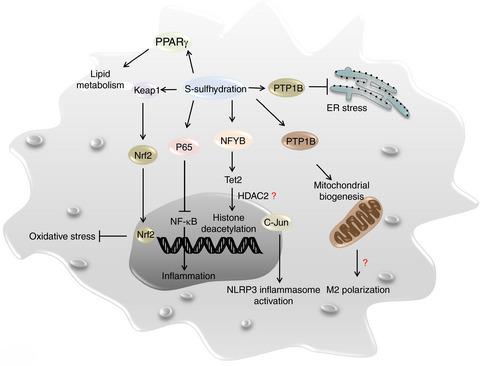当前位置:
X-MOL 学术
›
Immunology
›
论文详情
Our official English website, www.x-mol.net, welcomes your
feedback! (Note: you will need to create a separate account there.)
The role of hydrogen sulfide signaling in macrophage activation.
Immunology ( IF 4.9 ) Pub Date : 2020-09-02 , DOI: 10.1111/imm.13253 Fei Sun 1 , Jia-Hui Luo 1 , Tian-Tian Yue 1 , Fa-Xi Wang 1 , Chun-Liang Yang 1 , Shu Zhang 1 , Xin-Qiang Wang 2 , Cong-Yi Wang 1, 3, 4
Immunology ( IF 4.9 ) Pub Date : 2020-09-02 , DOI: 10.1111/imm.13253 Fei Sun 1 , Jia-Hui Luo 1 , Tian-Tian Yue 1 , Fa-Xi Wang 1 , Chun-Liang Yang 1 , Shu Zhang 1 , Xin-Qiang Wang 2 , Cong-Yi Wang 1, 3, 4
Affiliation

|
Hydrogen sulphide (H2S) is the latest identified small gaseous mediator enabled by its lipophilic nature to freely permeate the biological membranes. Initially, H2S was recognized by its roles in neuronal activity and vascular relaxation, which makes it an important molecule involved in paracrine signalling pathways. Recently, the immune regulatory function of gasotransmitters, H2S in particular, is increasingly being appreciated. Endogenous H2S level has been linked to macrophage activation, polarization and inflammasome formation. Mechanistically, H2S‐induced protein S‐sulphydration suppresses several inflammatory pathways including NF‐κB and JNK signalling. Moreover, H2S serves as a potent cellular redox regulator to modulate epigenetic alterations and to promote mitochondrial biogenesis in macrophages. Here in this review, we intend to summarize the recent advancements of H2S studies in macrophages, and to discuss with focus on the therapeutic potential of H2S donors by targeting macrophages. The feasibility of H2S signalling component as a macrophage biomarker under disease conditions would be also discussed.
中文翻译:

硫化氢信号在巨噬细胞活化中的作用。
硫化氢 (H 2 S) 是最新发现的小型气体介质,其亲脂性使其能够自由渗透生物膜。最初,人们认识到H 2 S 在神经元活动和血管舒张中的作用,这使其成为参与旁分泌信号通路的重要分子。最近,气体递质,尤其是H 2 S的免疫调节功能越来越受到重视。内源性 H 2 S 水平与巨噬细胞活化、极化和炎性体形成有关。从机制上讲,H 2 S 诱导的蛋白质 S-硫酸化可抑制多种炎症通路,包括 NF-κB 和 JNK 信号传导。此外,H 2S 作为一种有效的细胞氧化还原调节剂来调节表观遗传改变并促进巨噬细胞中的线粒体生物发生。在这篇综述中,我们打算总结巨噬细胞中 H 2 S 研究的最新进展,并重点讨论 H 2 S 供体通过靶向巨噬细胞的治疗潜力。还将讨论H 2 S 信号成分在疾病条件下作为巨噬细胞生物标志物的可行性。
更新日期:2020-09-02
中文翻译:

硫化氢信号在巨噬细胞活化中的作用。
硫化氢 (H 2 S) 是最新发现的小型气体介质,其亲脂性使其能够自由渗透生物膜。最初,人们认识到H 2 S 在神经元活动和血管舒张中的作用,这使其成为参与旁分泌信号通路的重要分子。最近,气体递质,尤其是H 2 S的免疫调节功能越来越受到重视。内源性 H 2 S 水平与巨噬细胞活化、极化和炎性体形成有关。从机制上讲,H 2 S 诱导的蛋白质 S-硫酸化可抑制多种炎症通路,包括 NF-κB 和 JNK 信号传导。此外,H 2S 作为一种有效的细胞氧化还原调节剂来调节表观遗传改变并促进巨噬细胞中的线粒体生物发生。在这篇综述中,我们打算总结巨噬细胞中 H 2 S 研究的最新进展,并重点讨论 H 2 S 供体通过靶向巨噬细胞的治疗潜力。还将讨论H 2 S 信号成分在疾病条件下作为巨噬细胞生物标志物的可行性。











































 京公网安备 11010802027423号
京公网安备 11010802027423号